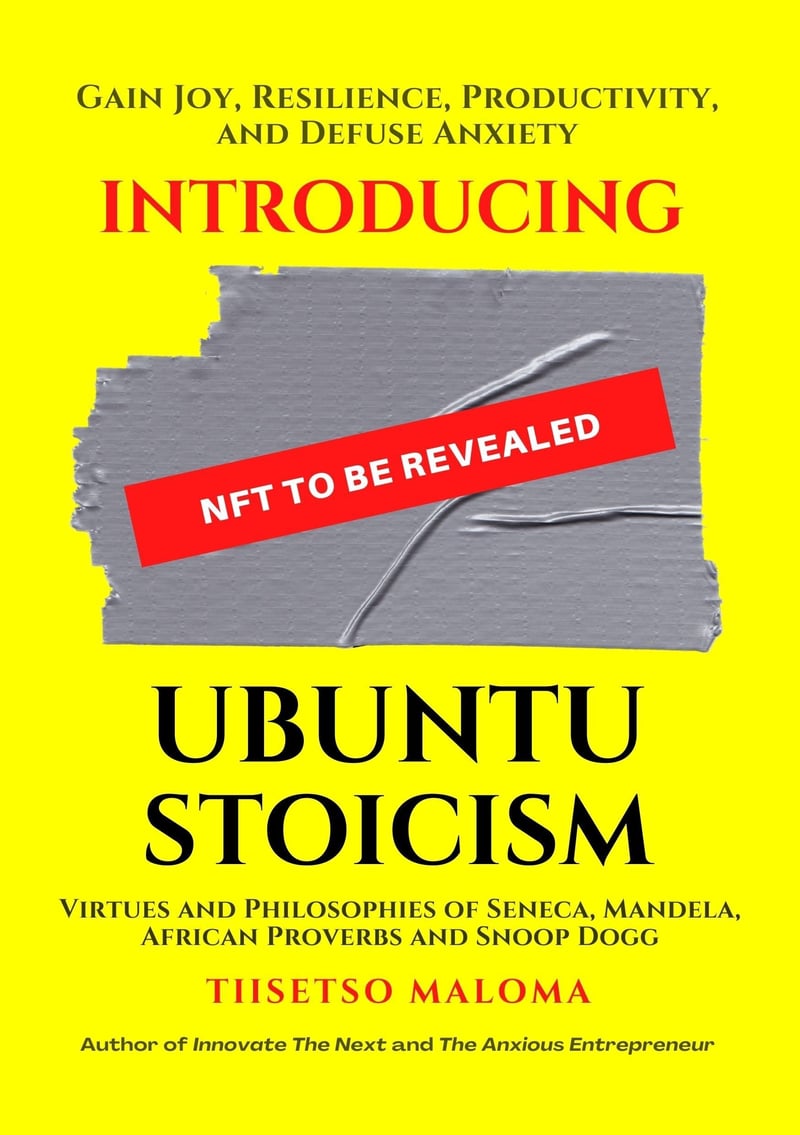What happens when an African philosophy meets a Greek philosophy? Introducing Ubuntu Stoicism
Written by: Hlabirwa Hlabirwa Save to Instapaper
South African writer and entrepreneur Tiisetso Maloma’s latest and eighth book fuses the two ancient philosophies of stoicism and ubuntu.
The book is titled ‘Introducing Ubuntu Stoicism: Gain Joy, Resilience, Productivity, and Defuse Anxiety.’
Stoicism is an ancient Greek philosophy founded in the 3rd century BC. It was practised by slaves, emperors, artists, politicians, businessmen and warriors.
“Stoicism’s intended benefit, among others, is to practice virtue – as it can’t be lived just in words – and to mitigate adverse events in life for they occur always. It is a simple and telling philosophy. It is as Emperor Marcus Aurelius put in his notes that ‘If it is not right do not do it; if it is not true do not say it.’ He was noting how he should conduct himself and to not let his position poison his ego or fragility,” adds Tiisetso.
On the other hand, in Africa, they use the ancient philosophy of ubuntu and its proverbs to reinforce virtues, humility, and cautionary discipline.
Ubuntu is an evolved philosophy from Sub-Saharan tribes that speak Bantu languages. It is languages such as Zulu and Sepedi in South Africa, Kirundi in Rwanda, Shona in Zimbabwe, and Kimutu in the Democratic Republic of Congo.
The variety and similarity in Bantu tribe languages is hypothesized as the Bantu expansion.
It is said a Proto-Bantu-speaking group started migration from West-Central Africa towards Sub-Saharan Africa about 5000 years ago (c. 3000 BC.).
To Maloma, it is humility to the self to not let external provocations steal focus from one’s day. It is, therefore, ubuntu to the self.
“Ubuntu in a relational sense means I am because we are. If I want you to be better, I should be better. Ubuntu signals a sense of personal responsibility. The community benefits from the virtues of responsible individuals. They also serve as inspiration to others, the younger generation particularly. This is what also stoicism is about,” explains Maloma.
Tiisetso was introduced to stoicism through the author Tim Ferris’s podcast around 2014. He’s been meditating on the philosophy’s approach to life since then.
“My first stoic writings made it into my fourth book The Anxious Entrepreneur in 2016. In 2019 I wrote an article that in a stoic sense mediated on African Proverbs. It is where coined the phrase ‘ubuntu stoicism.’”
The fusing of different philosophies does happen in philosophy and academia. There is a course called ‘From the Stoics to Ubuntu: Philosophies of the Good Life’ at Bennington College in the United States.
Tiisetso’s publisher Bula Buka says they plan to release an NFT sculpture which will feature on the cover of the book on release day.
NFTs (Non-Fungible Tokens) are a new craze in the crypto world.
This is Tiisetso’s eighth book and is a slight deviation from his usual entrepreneurship and innovation writings.
Maloma is an entrepreneur, award-winning publisher and innovation scholar. His other books include The Anxious Entrepreneur and Forget the Business Plan Use this Short Model.
Get new press articles by email
Mzanzi Agency is a Social Media marketing and activation agency with actual Social Media pages with a total of over 2 million followers.
Latest from
- South African Author’s Ubuntu Stoicism Inspires a New Literary Genre
- VentureBooks OS — Africa’s First IP & Storytelling Operating System Set to Launch Thousands of African Books in Africa and Globally
- Help Support Rapid Skills Courses in Sneaker Cleaning, Nail Technology, and Barbering
- South African entrepreneur releases book on Elon Musk's innovation strategies
- Atimeme Helps South African Brands Jump on the Meme-Marketing Bandwagon With the Most Viral Creatives
The Pulse Latest Articles
- Opinion Piece: Activating Leadership To Engage The Passive Workforce (February 11, 2026)
- Tchagra Trail Wilderness Consulting Launches A New Safari Experience In Photography And Tracking (February 9, 2026)
- Magic: The Gathering Releases Lorwyn Eclipsed (February 6, 2026)
- Back To Work, Back To Balance: Rethinking The 3pm Slump (February 5, 2026)
- Back-to-school Lunchboxes That Just Make Sense (February 5, 2026)
